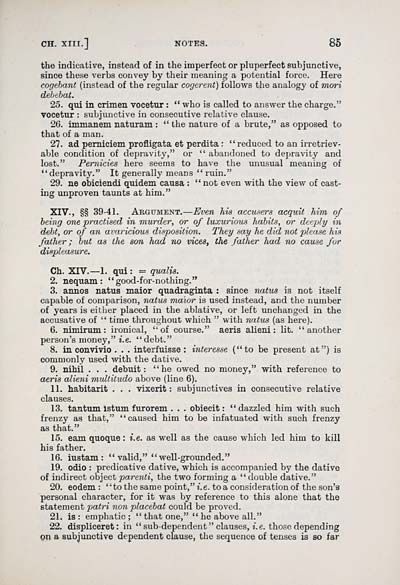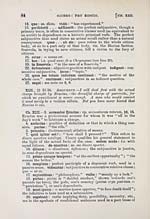Download files
Complete book:
Individual page:
Thumbnail gallery: Grid view | List view

CH. XIII.] NOTES. 85
the indicative, instead of in the imperfect or pluperfect subjunctive,
since these verbs convey by their meaning a potential force. Here
cogehant (instead of the regular coijerent) follows the analogy of mori
debtbat.
25. qui in crimen vocetur : " who is called to answer the charge."
vocettir : subjunctive in consecutive relative clause.
26. immanem naturam : " the nature of a brute," as opposed to
that of a man.
27. ad pemiciem profligata et perdita : " reduced to an irretriev-
able condition of depravity," or " abandoned to depravity and
lost." Pemicies here seems to have the unusual meaning of
"depravity." It generally means " ruin."
29. ne obiciendi quidem causa : " not even with the view of cast-
ing unproven taunts at him."
XIV., §§ 39-41. Argument. — Even his accusers acquit him of
being cme practised in murder, or of luxurious habits, or deeply in
debt, or of an avaricious disposition. They say he did not please his
faiher; but as the son had no vices, the father had no cause for
displeasure.
Ch. XIV. — 1. qui : = qualis.
2. nequam : "good-for-nothing."
3. annos natus maior quadraginta : since natus is not itself
capable of comparison, natus maior is used instead, and the number
of years is either placed in the ablative, or left unchanged in the
accusative of " time throughout which " with Tvxtus (as here).
6. nimirum : ironical, " of course." aeris alieni : lit. " another
person's money," i.e. "debt."
8. in convivio . . . interfuisse : interesse ("to be present at") is
commonly used with the dative.
9. nihil . . . debuit : "he owed no money," with reference to
aeris alieni midtitudo above (line 6).
11. habitarit . . . vixerit : subjunctives in consecutive relative
13. tantum istiun furorem . . . obiecit : " dazzled hira with such
frenzy as that," "caused him to be infatuated with sueh frenzy
as that."
15. eam quoque : i.e. as well as the cause which led him to kill
his father.
16. iustam : " valid," "well-grounded."
19. odio : predicative dative, which is accompanied by the dative
of indirect object parenti, the two forming a " double dative."
20. eodem : "tothesamepoint,"{.e. toaconsiderationof theson'3
personal character, for it was by reference to this alone that the
statement patri non placebat could be proved.
21. is : emphatic ; " that one," " he above all."
22. displiceret: in "sub-dependent" clauses, i.e. thosedepending
on a subjunctive dependent clause, the sequence of tenses is so far
the indicative, instead of in the imperfect or pluperfect subjunctive,
since these verbs convey by their meaning a potential force. Here
cogehant (instead of the regular coijerent) follows the analogy of mori
debtbat.
25. qui in crimen vocetur : " who is called to answer the charge."
vocettir : subjunctive in consecutive relative clause.
26. immanem naturam : " the nature of a brute," as opposed to
that of a man.
27. ad pemiciem profligata et perdita : " reduced to an irretriev-
able condition of depravity," or " abandoned to depravity and
lost." Pemicies here seems to have the unusual meaning of
"depravity." It generally means " ruin."
29. ne obiciendi quidem causa : " not even with the view of cast-
ing unproven taunts at him."
XIV., §§ 39-41. Argument. — Even his accusers acquit him of
being cme practised in murder, or of luxurious habits, or deeply in
debt, or of an avaricious disposition. They say he did not please his
faiher; but as the son had no vices, the father had no cause for
displeasure.
Ch. XIV. — 1. qui : = qualis.
2. nequam : "good-for-nothing."
3. annos natus maior quadraginta : since natus is not itself
capable of comparison, natus maior is used instead, and the number
of years is either placed in the ablative, or left unchanged in the
accusative of " time throughout which " with Tvxtus (as here).
6. nimirum : ironical, " of course." aeris alieni : lit. " another
person's money," i.e. "debt."
8. in convivio . . . interfuisse : interesse ("to be present at") is
commonly used with the dative.
9. nihil . . . debuit : "he owed no money," with reference to
aeris alieni midtitudo above (line 6).
11. habitarit . . . vixerit : subjunctives in consecutive relative
13. tantum istiun furorem . . . obiecit : " dazzled hira with such
frenzy as that," "caused him to be infatuated with sueh frenzy
as that."
15. eam quoque : i.e. as well as the cause which led him to kill
his father.
16. iustam : " valid," "well-grounded."
19. odio : predicative dative, which is accompanied by the dative
of indirect object parenti, the two forming a " double dative."
20. eodem : "tothesamepoint,"{.e. toaconsiderationof theson'3
personal character, for it was by reference to this alone that the
statement patri non placebat could be proved.
21. is : emphatic ; " that one," " he above all."
22. displiceret: in "sub-dependent" clauses, i.e. thosedepending
on a subjunctive dependent clause, the sequence of tenses is so far
Set display mode to: Large image | Transcription
Images and transcriptions on this page, including medium image downloads, may be used under the Creative Commons Attribution 4.0 International Licence unless otherwise stated. ![]()
| Early Gaelic Book Collections > Matheson Collection > Pro S. Roscio Amerino > (93) |
|---|
| Permanent URL | https://digital.nls.uk/76503355 |
|---|
| Description | Items from a collection of 170 volumes relating to Gaelic matters. Mainly philological works in the Celtic and some non-Celtic languages. Some books extensively annotated by Angus Matheson, the first Professor of Celtic at Glasgow University. |
|---|
| Description | Selected items from five 'Special and Named Printed Collections'. Includes books in Gaelic and other Celtic languages, works about the Gaels, their languages, literature, culture and history. |
|---|

